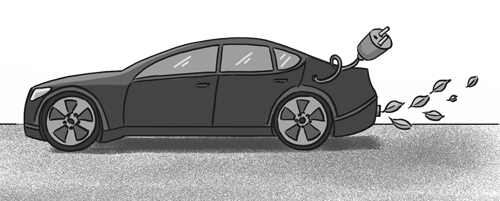COMMENTS / COLUMNISTS
Electric car market contest will be fierce, but clean

Illustration: Xia Qing/GT
Electric vehicles are environmentally friendly, and now are gradually moving from the periphery of the auto industry to be broadly accepted by Chinese consumers. Whether EVs will outshine internal combustion cars and be a mainstream force on China's roads remains elusive.Sales of new energy cars have been flat to date in 2019, as the central and provincial governments slashed incentives in the middle of the year, by reducing fiscal subsidies to the buyers. As a result, this year's total electric vehicle sales are predicted to come close to 1.25 million, on par with 2018 sales.
The authorities in Beijing are discussing possible policy tools to support the industry in the medium to long run. As an emerging strategic industry, China needs to dangle ample government incentives to inspire massive buyers and cultivate the market.
To classify it as a strategic industry means major global economies are now investing heavily in EVs, which will become a hotly contested battleground among the world's top 10 largest economies - including US, Germany, Japan,, France, South Korea and China.
For the health of a 1.4 billion population, China needs to ramp up efforts to leapfrog the competitors and be the global frontrunner in phasing out emission-heavy fossil fuel gas-guzzlers from its streets and rapidly replacing them with EVs. In addition to drastically cut greenhouse gas emissions and help the global environmental cause, the country's vast elderly people and underage children deserve to inhale fresher and pollutant-free air.
With a spate of well-choreographed government incentives and publicity schemes promoting quick sales of zero-emissions EVs, Chinese consumers will make informed choices about the economic and environmental advantages of going all-electric.
On December 3, the State Council's Ministry of Industry and Information Technology (MIIT) enacted that by 2025 a quarter of all new car sales in China should be new-energy vehicles, indicating that up to 7.5 million out of that year's estimated 30 million annual car sales will be electric. It's a courageous government plan.
To realize the set target, China must mete out polices of efficacy, for instance, learning from Norway and France by outlawing gas-fired vehicle sales in 2040, or even earlier. At present, only China's southern tropical Hainan island rules that fossil fuel cars must not be marketed there in 2030.
More Chinese provinces should follow the steps of Hainan, experts say. Only by decimating anticipations, scores of the world's car manufacturers will be forced to investi more in EV motors, batteries and electronic systems, and simultaneously, the consumers will be lured to refuse dirty internal combustion cars and embrace EVs.
And, government incentives should go up accordingly, as price remains a primary consideration for most car buyers. For example, Norway's generous incentives have pushed the EV market share close to 60 percent. In South China, Shenzhen city has made its fleet of public buses and taxi cabs all-electric, while 80 percent of Beijing's buses are now electric.
China's high-tech internet upstarts also play a role in accelerating widespread EV use. Car-hailing platforms like Didi Chuxing is directing its drivers to buy electric vehicles, and many courier services now demand their senders to ride electric scooters.
In 2020, there will be some heavyweight electric car manufacturers entering China's market, including Volkswagen, Tesla and Toyota. Volkswagen is to launch two electric car factories in 2020, with yearly production reaching 1 million in 2022, according to news reports. Domestically, BYD in Shenzhen, BAIC in Beijing, NIO in Shanghai, Xpeng in Guangzhou and Byton in Nanjing will be the major EV forces contesting in the battleground.
The author is an editor with the Global Times. bizopinion@globaltimes.com.cn
